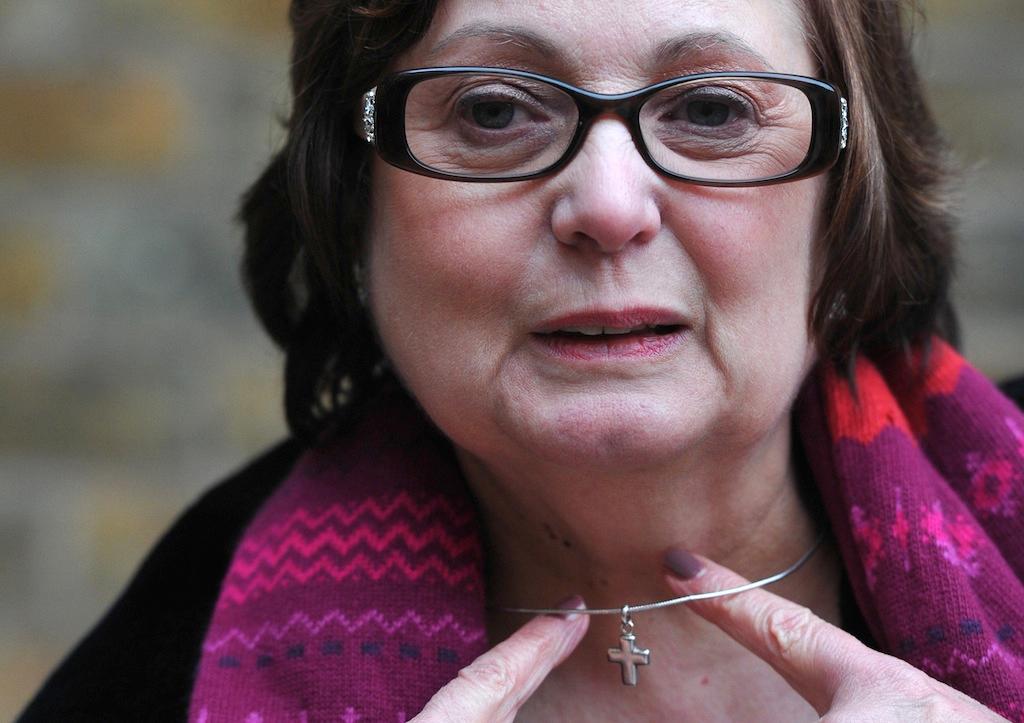Europe’s top human rights court defines limits of religious freedom
British Airways employee Nadia Eweida holds her crucifix as she poses for pictures after the European Court of Human Rights ruled that she suffered discrimination at work over wearing a cross in central London on Jan. 15, 2013.
Europe's top human rights court ruled Tuesday on four landmark cases that may define the limits of religious freedom when those rights infringe on equality laws and safety.
The European Court of Human Rights (ECHR) ruled in favor or a British Airways employee told not to wear a crucifix at work, but ruled against three other plaintiffs who also claimed religious discrimination.
Coptic Christian Nadia Eweida will receive $2,674 in the ECHR decision, which stated: "The domestic authorities failed sufficiently to protect the first applicant's right to manifest her religion, in breach of the positive obligation under article 9."
Article 9 of The European Convention on Human Rights protects freedom of thought, religion and conscience.
However, Christian's Lilian Ladele, Shirley Chaplin and Gary McFarlane all lost their appeals.
Ladele, a City Hall registrar, was disciplined when she refused to officiate at same-sex civil partnership ceremonies, and relationship counsellor Gary McFarlane fired after expressing objections to offering sex therapy advice to gay couples.
"The most important factor to be taken into account was that the policies of the applicants’ employers — to promote equal opportunities and to require employees to act in a way which did not discriminate against others — had the legitimate aim of securing the rights of others, such as same-sex couples," the court ruled.
Based in the French city of Strasbourg, the court also threw out Chaplin's complaint, saying her employer had legitimate health and safety reasons for asking her to remove a cross necklace.
In Eweida's case, the court pointed out that BA had previously authorized other employees to wear religious clothing such as turbans and hijabs.
"Fair balance had not been struck between, on the one side of the scales, her desire to manifest her religious belief and to be able to communicate that belief to others, and on the other side of the scales, her employer’s wish to project a certain corporate image," the court ruled.
The airline has since changed its policy to allow employees to wear crosses.
Human rights groups generally welcomed the judges' decision.
Keith Porteous Wood, Executive Director of the National Secular Society said in a statement:
"First and foremost, this ruling demonstrates that UK equality law is fully compatible with the European Convention on Human Rights and that there is no need to change UK law. Any attempt to do so by the Government would therefore signal a clear desire to give privileged treatment to religious believers, and would be robustly challenged."
England's Prime Minister David Cameron, leader of the Conservative Party and a frequent critic of the court, responded to the ruling via Twitter by voicing approval of Eweida's court victory:
Appeals may be made to the ECHR's Grand Chamber. Eweida told the Guardian she hoped the three other plaintiffs would do exactly that.
"I'm disappointed on behalf of the other three applicants but I fully support them in their asking for a referral for their [appeals] to be heard in the [ECHR's] grand chamber, and I wish them every success in the future to win," she said.
The Evangelical Alliance condemned the Strasbourg ruling, saying it showed a "hierarchy of rights now exists in UK law."
But for now it seems religious freedom, at least in these rulings, does not come before other human rights.
For example, registrar Ladele had in 2007 refused to conduct a gay couple's civil union on the grounds that it was against her religion. The London borough of Islington then "disciplined" him, according to Reuters, and ECHR thought that right.
Rights of religious expression at work or school are a tricky issue in many parts of Europe. France in particular triggered opposition, notably from Muslim groups, by banning religious symbols such as headscarves, skullcaps or crosses from schools.
Britain has generally take a more relaxed view, adapting police uniforms, for example, to allow Muslim or Sikh officers to wear traditional head-coverings. However, some Christians feel they are the targets of discrimination.
We want to hear your feedback so we can keep improving our website, theworld.org. Please fill out this quick survey and let us know your thoughts (your answers will be anonymous). Thanks for your time!
